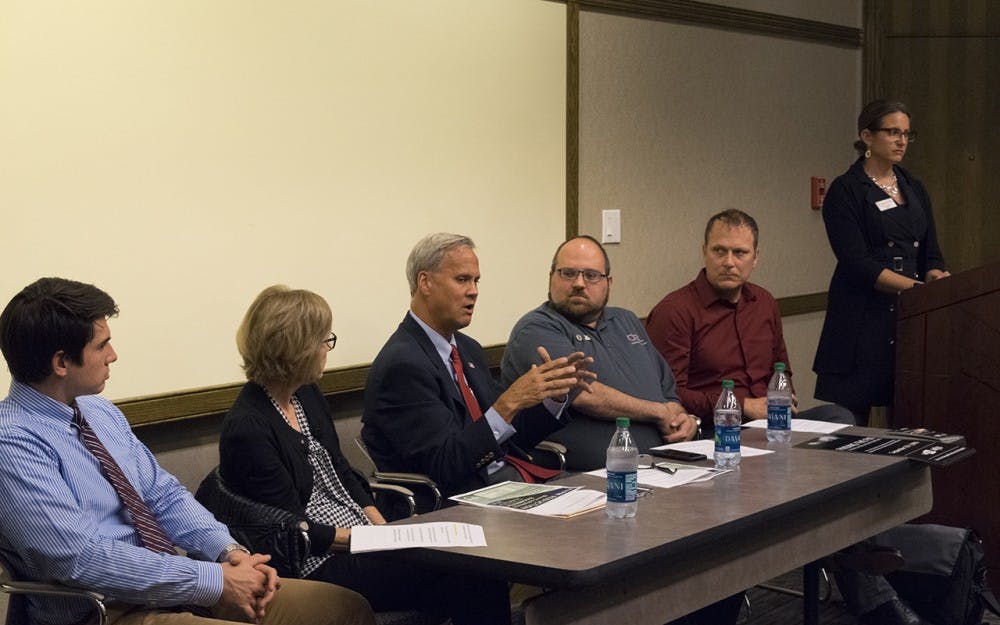There’s an 18-headed monster, Sen. Jim Merritt, R-Indianapolis, said, and we’re playing whack-a-mole.
The monster is Indiana’s multi-faceted substance addiction problem, and the game of whack-a-mole is a concordant effort to fight this problem.
The panel discussion in which Merritt spoke Wednesday evening was Pathways to Recovery, organized by OASIS and Students in Recovery. It attracted an audience of students and locals ready to learn about campus and community resources for harm reduction and addiction recovery.
Panelists included a recovering student an local and state nonprofit representatives, Merritt and Dr. Diana Ebling.
Quinn Bush, a founding member of Students in Recovery, said he realized he had a substance problem within a few months of coming to IU.
The first steps of his recovery required time off from school, but when he came back, he reached out to OASIS director and panel moderator Jackie Daniels and fellow recovering students for the support community he knew would benefit him.
The result was Students in Recovery, which Daniels said will begin holding office hours in the IMU within the next month.
Daniels also said, in accordance with the Americans with Disabilities Act, recovering students can register with the IU Office of Disability Services for Students. Doing so allows them to balance classes with ensuring they remain substance-free.
As a part of the Health Center, OASIS is only one of the departments focused on harm reduction and recovery.
“I learned a lot firsthand about the denial that goes along with addiction,” said Ebling, Health Center medical director, in reference to her father, who suffered with alcoholism.
“We’re trying to meet a student where they’re at and provide them with a non-judgmental atmosphere.”
Her greatest concern is the normality of binge drinking, but others in the panel focused on opioids and naloxone.
One of those panelists was Overdose Lifeline, Inc. board member Aaron Kochar. Overdose Lifeline is an Indiana nonprofit addressing the opioid epidemic through education, harm reduction, resources and support.
“My personal goal is that everybody has naloxone and can use it,” Kochar said. “It is going to keep someone alive. It’s not treating addiction so much as it’s giving them a lifeline in that moment.”
That lifeline, he said, would lead to treatment.
To achieve Kochar’s goal, Overdose Lifeline had to begin pushing for legislation.
“Fortunately, we found an avenue in Senator Merritt,” Kochar said.
Merritt championed legislation called Aaron’s Law after the Overdose Lifeline director’s son, who overdosed on opioids in 2013.
The law allowed addicts and their families to access naloxone and provided legal immunity for prescribing doctors, as well as those administrating the medicine.
Merritt then went a step further to help make naloxone an over-the-counter medication, available at local pharmacies like CVS and the Health Center.
The legislative work also opened doors for the Indiana Recovery Alliance, a Bloomington-based nonprofit which provides free safer use and overdose reversal training, as well as triage services, treatment referrals and supplies like clothes and first aid kits, among other things.
“Because of the criminalization and stigma, this has to be the lowest barrier possible,” panelist and IRA representative Chris Abert said. “Or it’s just not going to work.”
He said the fastest rising demographic for opioid addiction, which typically starts at the prescription drug level, is 18- to 25-year-olds — the same age as most college students.
“There’s no magic bullet to this,” Abert said. “It has to be a concordance of well-funded solutions.”
That concordance is what the campus and the community and the state are working to build.




